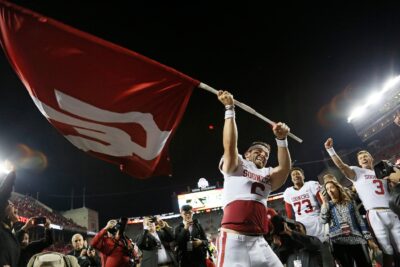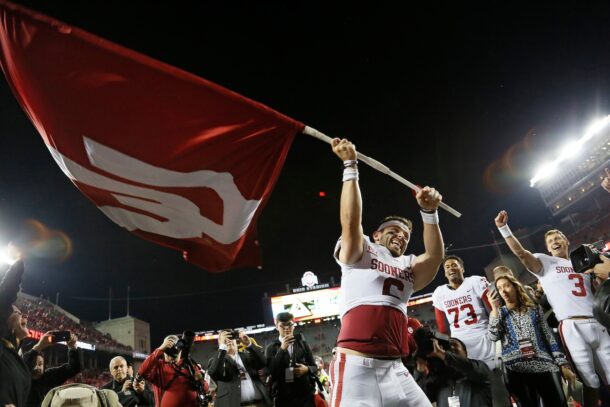
Ole Miss culminated spring practice with Saturday’s Grove Bowl. Fans got a glimpse of what the 2021 version of the Rebels will look like in Year 2 under Lane Kiffin.
Matt Corral looked sharp, the defense seemed to have newfound energy and confidence and the younger quarterbacks behind Corral got some valuable snaps. There’s still a lot to learn about this team before the season begins, but with all of that in mind, what are 5 things that will define Ole Miss’ offense next fall? Let’s take a look.
1. The health of wide receiver Braylon Sanders
Sanders is the most experienced receiver for a unit looking to replace All-American Elijah Moore. He showed promise early in his career and tallied 16 receptions as a sophomore while competing for targets amongst the likes of D.K. Metcalf, A.J. Brown and DaMarkus Lodge but has been saddled by injuries the last 2 seasons.
Sanders was productive when he played last year but was limited with nagging injuries. He played in 9 games but wasn’t at full strength for many of them. Sanders is too talented to only have 15 catches, his total from last season.
As the Rebels head into this season, they’re going to need to find a go-to target. Sanders’ speed and athleticism stretches defenses and he is a legitimate deep threat that could make life easier on other receivers — if he can stay on the field. Sanders’ health and success are huge for this Ole Miss team.
2. The maturation of Matt Corral
This was the first offseason Corral has had the same head coach, coordinators and system since his sophomore year of high school, and the continuity should help him develop into a more consistent passer. Corral put up huge numbers last season and was the most valuable piece in an offense that lit up the scoreboard. We all know turnovers plagued him. Corral had two games with 5 or more interceptions, and Ole Miss lost both.
The turnovers also put a wretched defense in some difficult spots and it usually did not end well.
Kiffin and Jeff Lebby don’t want to coach the aggressiveness out of Corral’s game, but he has to make smarter decisions. If he can eliminate some of his more egregious mistakes, the Rebels will benefit, particularly the defense. Consistency and stability are not things Corral has been surrounded with until now, and it’s on him to use them as tools to get better and eliminate mistakes. If he is able to do that, this offense will be a sight to behold next fall.
3. John Rhys Plumlee and where he plays
This may be the most interesting storyline to follow as it pertains to this offense. Plumlee played very little at quarterback in 2020, aside from a few gadget packages and plays. The speedster caught 5 passes in the slot in the team’s Outback Bowl win over Indiana, a move that was born out of necessity because of injuries and opt-outs.
Now the question becomes whether Plumlee makes the permanent transition to receiver, remains at quarterback or tries to do both. (He’s an elite athlete and outfielder, so he’s clearly comfortable tracking balls and catching them.)
We didn’t gain much insight on the football plans from the spring because Plumlee is playing baseball, but after watching the two young quarterbacks behind Corral on Saturday, one can’t help but wonder if the staff trusts Kinkead Dent or Luke Altmeyer to be a true backup. Dent was 7-for-25 and threw 3 interceptions. Altmeyer was 3-for-9 and also threw an interception.
I would lean toward the idea of Plumlee playing some receiver, having a package of plays at quarterback to utilize his elite speed and then being the next man up Corral has to miss any time. I just don’t see how this coaching staff can feel confident enough to move him to receiver and shut the door on him playing quarterback.
Whatever happens and however it plays out will help determine the offense’s ceiling.
4. Field-goal kicking
Stay with me here, and scoff if you want, but incompetence at kicker absolutely affected Ole Miss offensively last year. Luke Logan made just 1 kick beyond 30 yards and it became evident early in the season that Kiffin and Lebby made a conscious decision to be hyper-aggressive offensively, whether it came to red-zone play calling or 4th-down decision-making because of the ineptitude on special teams.
Sometimes it paid off and sometimes it bit the Rebels. But having a serviceable kicking battery at a minimum will make this offense better from a play-calling standpoint. Knowing you can settle for 3 if you have to will change the way Kiffin and Lebby look play calling, at least to some degree. Not to mention, it will equate to more points on the board rather than missed kicks, turnover on downs and empty possessions.
5. Who emerges at tight end?
The tight end position is a staple in any Kiffin offense. He coached Harrison Bryant to Mackey Award in 2019 and Florida Atlantic and totally changed grad transfer Kenny Yeboah’s draft stock last fall. Who fills in Yeboah’s shoes?
Casey Kelly, the brother of Chad Kelly, saw more targets after Yeboah opted out of the final 2 games, and Louisiana transfer Chase Rogers is likely to be in the mix more this season. Freshman tight end Hudson Wolfe will likely be a factor to some degree, too. If Ole Miss can duplicate the production it got out of this position last year, it will be a better offense next fall.







